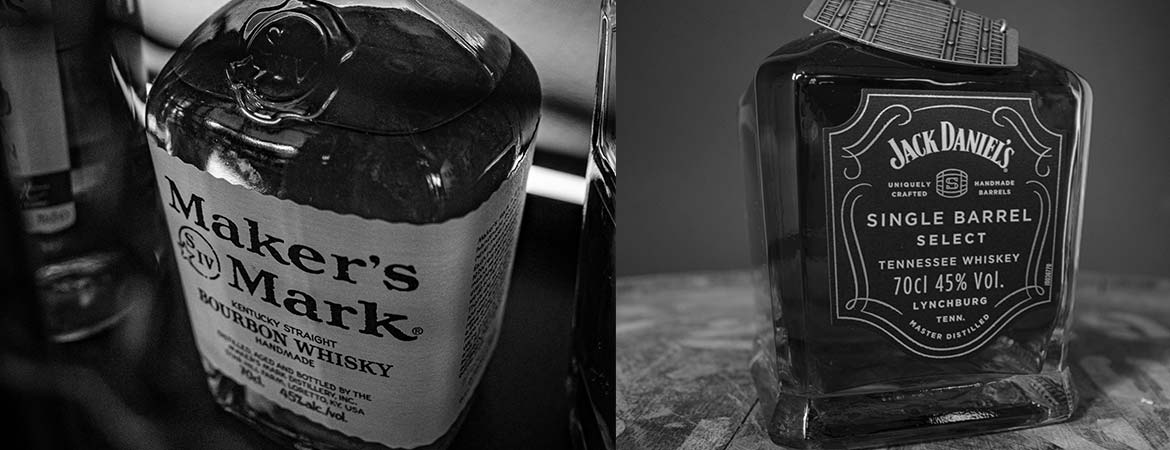Key Takeaways
Unique Production Processes: Kentucky Bourbon is crafted with specific aging techniques and natural resources unique to Kentucky, giving it a robust flavor. Tennessee Whiskey, distinct for its smoothness, undergoes the Lincoln County Process of charcoal filtering, exclusive to Tennessee.
Differing Geographic Significance: The identities of these whiskeys are rooted in their locations. Kentucky Bourbon, synonymous with the state’s rich whiskey heritage, must be produced in Kentucky. Tennessee Whiskey is strictly made within Tennessee, adhering to traditional practices and legal definitions specific to the region.
Differing Flavor Profiles: While both offer rich, full-bodied flavors, Kentucky Bourbon is known for its robust notes of caramel, vanilla, and oak, and Tennessee Whiskey is often smoother and mellower due to its unique charcoal filtering process.
Common Corn Base: Both spirits contain at least 51% corn in their mash bills, contributing to a foundational sweetness and rich flavor profile.
Both are aged in Charred Oak Barrels: Both are aged in new, charred oak barrels, although Tennessee Whiskey does not have a specified minimum aging period, unlike Kentucky Bourbon, which requires at least 1 year of aging.
Venn Diagram: Craft Cask – Kentucky Bourbon vs Tennessee Whiskey
What is Kentucky Bourbon?
Kentucky Bourbon is a renowned style of bourbon whiskey, synonymous with the rich heritage and tradition of the Bluegrass State. This corn-based, barrel-aged spirit is celebrated for its depth of flavor and smoothness, attributes shaped by Kentucky’s unique natural resources and historical distilling practices.
Within the broad category of Kentucky Bourbon, small batch bourbons have gained prominence for their artisanal approach. These bourbons are typically produced in limited quantities, with each batch carefully crafted to achieve a specific flavor profile, often resulting in a higher quality and more unique tasting experience.
While legally Bourbon can be produced anywhere in the United States, Kentucky Bourbon stands apart due to the state’s longstanding association with high-quality bourbon production.
What qualifies as Kentucky Bourbon?
Produced in Kentucky: While the legal criteria for Bourbon allow for production across the United States, Kentucky Bourbon, as implied by its name, refers specifically to Bourbon made in Kentucky. This region is famed for its ideal conditions for Bourbon production, including its climate and limestone-filtered water, which contribute significantly to the distinctive flavor profile of Kentucky Bourbon.
Contain at least 51% corn in its mash bill: Central to its unique flavor, Kentucky Bourbon must have a mash bill consisting of at least 51% corn. This high corn content imparts a natural sweetness, setting the foundation for its rich and full-bodied profile.
Aged in new, charred oak barrels: A defining requirement, Kentucky Bourbon is aged for no less than 1 year in new, charred oak barrels. This not only imparts a deep amber color but also flavors of vanilla, caramel, and oak, essential to its distinctive taste.
What is Tennessee Whiskey?
Tennessee Whiskey is a distinguished type of American whiskey, celebrated for its unique production process and smooth, rich flavor. Deeply rooted in the heritage of Tennessee, this spirit stands out for its strict adherence to traditional distilling methods and specific geographic origin. While sharing some similarities with Bourbon, Tennessee Whiskey is distinct due to key production steps that are unique to the state.
What qualifies as Tennessee Whiskey?
Produced in Tennessee: Tennessee Whiskey must be distilled and aged in the state of Tennessee. The region’s natural resources, including its climate and water source, play a crucial role in shaping the whiskey’s character, contributing to its distinct taste profile.
Contain at least 51% corn in its mash bill: Similar to Bourbon, Tennessee Whiskey requires a mash bill with a minimum of 51% corn. This high corn content provides a foundational sweetness and rich flavor, typical of this type of whiskey.
Charcoal Filtering – Lincoln County Process: A defining feature of Tennessee Whiskey is the Lincoln County Process, where the whiskey is filtered through sugar maple charcoal prior to aging. This extra step, unique to Tennessee Whiskey, mellows the spirit and imparts a smooth, distinctive flavor.
Aged in new, charred oak barrels: Tennessee Whiskey is also aged in new, charred oak barrels, but unlike Kentucky Bourbon, there is no specified minimum aging period. This aging process contributes to the whiskey’s color and imparts classic flavors of caramel, vanilla, and oak.
Similarities and differences compared: Kentucky Bourbon vs Tennessee Whiskey
In the realm of American whiskey, distilleries play a pivotal role in defining the distinct qualities of bourbon and Tennessee whiskey. Each distiller, whether in Kentucky or Tennessee, contributes to the rich tapestry of flavors and traditions that distinguish these spirits.
While both are celebrated, what makes Tennessee whiskey different is its unique production process, setting it apart in the landscape of bourbon and Tennessee whiskey.
Origin
Ingredients
Distillation
Aging Process
Min. Aging Period
Filtration
Flavor Profile
Alcohol Content
Regulatory Requirements
Cultural Significance
Kentucky Bourbon
Made in Kentucky, USA. Exclusive name for local bourbon
At least 51% corn in grain mixture
Max 160 proof (80% alcohol)
New, charred oak barrels
No min. for straight bourbon; 2+ years to avoid "young" label
No specific filtration required
Rich, full-bodied, caramel, vanilla, oak
At least 80 proof (40% alcohol)
Specific federal bourbon standards
Deeply rooted in Kentucky heritage
Tennessee Whiskey
Must be made in Tennessee, USA
Similar grain mixture as Bourbon, often corn-rich
Max 160 proof (80% alcohol)
New, charred oak barrels
No specific min., but generally aged for years
Lincoln County Process: maple charcoal filtration
Smoother, mellower than Bourbon, charcoal influence
At least 80 proof (40% alcohol)
Must meet Tennessee whiskey criteria, produced in Tennessee
Integral to Tennessee culture and history
Famous Brands: Tennessee Whiskey vs Kentucky Bourbon
The world of Tennessee Whiskey and Kentucky Bourbon is rich with renowned brands, each with its own unique story and flavor profile. These brands not only offer a diverse range of flavors and styles but also embody the rich heritage and meticulous craftsmanship of American whiskey-making.
Famous Kentucky Bourbon Brands

Jack Daniels Tennessee Whiskey
Jack Daniels stands as a global icon in the world of Tennessee Whiskey, known for its smooth, charcoal-mellowed character. This brand’s signature process involves filtering through sugar maple charcoal, known as the Lincoln County Process, which imparts a unique smoothness to the whiskey. Jack Daniels is recognized not only for its distinctive flavor but also for its widespread popularity and cultural significance.

George Dickel Tennessee Whiskey
George Dickel prides itself on its traditional approach to whiskey making and strict adherence to quality. This brand is known for its meticulous production process, which includes chilling the whiskey before it undergoes the Lincoln County Process, ensuring a smoother finish. George Dickel’s range of whiskeys is celebrated for their rich flavors and craftsmanship, embodying the heritage of Tennessee Whiskey.
Famous Tennessee Whiskey Brands

Maker’s Mark Kentucky Straight Bourbon
Celebrated for its handcrafted approach, Maker’s Mark is distinguished by its distinctive red wax seal. This brand is notable for using red winter wheat in its mash bill, instead of the more traditional rye, which gives its bourbon a softer and sweeter flavor profile. Maker’s Mark is committed to quality, reflected in its small-batch production and careful aging process.

Woodford Reserve
Known for its complex and balanced flavor, Woodford Reserve is a testament to traditional bourbon production methods. This brand emphasizes the importance of the fermentation and distillation processes, as well as the mineral-rich waters of Kentucky, which contribute to its rich flavor. Woodford Reserve’s bourbons are characterized by their full-bodied taste, smooth finish, and aromatic richness.

Jim Beam
With its extensive history, Jim Beam remains one of the most popular Bourbon brands worldwide. This brand is renowned for its versatility and smoothness, appealing to a wide range of palates. Jim Beam’s bourbon is made using a time-honored recipe and aged twice as long as required by law, resulting in a consistent, high-quality spirit that embodies the classic characteristics of Kentucky Bourbon.
Sipping preference: Kentucky Bourbon and Tennessee Whiskey
The choice between Tennessee Whiskey and Kentucky Bourbon often comes down to personal preference, influenced by individual taste profiles and experiences. Some may prefer the smooth, mellow character of Tennessee Whiskey, while others might lean towards the rich, bold flavors of Kentucky Bourbon.
Tasting and comparing these whiskeys side by side is an excellent way to understand and appreciate their differences. Experimenting with various brands and expressions can reveal the nuances and subtleties that make each type unique. Ultimately, the debate is less about which is better and more about the diversity and richness they both bring to the world of spirits.
Final thoughts on Kentucky Bourbon and Tennessee Whiskey
Kentucky Bourbon and Tennessee Whiskey, each with their distinct production methods, histories, and flavor profiles, offer a rich tapestry of tastes and experiences. Understanding their differences and similarities not only enhances the appreciation of these spirits but also invites exploration and discovery. Whether sipping them neat, using them in culinary creations, or simply debating their merits, both Kentucky Bourbon and Tennessee Whiskey stand as proud representatives of American whiskey tradition. We encourage enthusiasts and novices alike to explore, taste, and enjoy the distinct charms of both.
Frequently asked questions about Kentucky Bourbon & Tennessee Whiskey
Share on social media:












